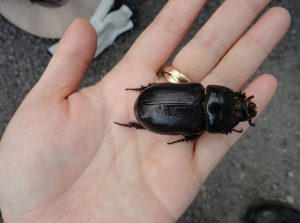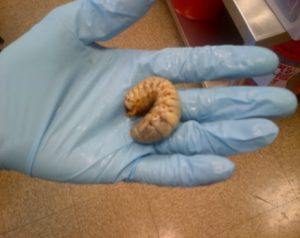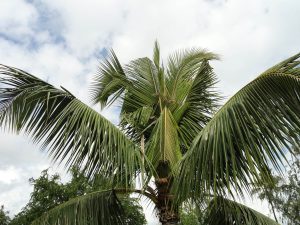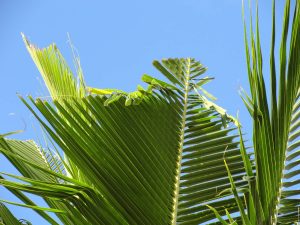Drone Treatment of Palm Trees Planned at Kauai Golf Course to Kill Coconut Rhinoceros Beetles
Posted on Oct 2, 2023 in MainNR23-22
October 2, 2023
HONOLULU – The Hawai‘i Department of Agriculture (HDOA) and University of Hawai‘i (UH) researchers will be conducting drone-based treatment of palm trees at the Wailua Municipal Golf Course in Līhu‘e, Kaua‘i, between October 9 and 12 (weather permitting), in an effort to eliminate an infestation of the coconut rhinoceros beetle (CRB). So far, 31 adult CRB have been found in traps at the golf course.
UH researchers, Dr. Dan Jenkins and Mohsen Paryavi have been developing the drone-based treatment on O‘ahu and will be piloting the drones on Kaua‘i. The goal is to treat about 20 percent of the approximately 580 coconut palm trees at the site with the pesticide, Cypermethrin (also known as the general use pesticide, Demon Max), which has been found to be effective in killing CRB. Palm trees on the property range from 60 to 90 feet tall.
“With the extreme height of the palm trees, overhead pesticide treatment is the best way to reach the crowns of the palms where the CRB bore into the trees,” said Sharon Hurd, chairperson of the Hawai‘i Board of Agriculture. “The drones also provide a more targeted and efficient application of the pesticide rather than widespread spraying.”
Parts of the golf course will be closed to the public during the treatment:
- the front nine holes will be closed from 10 a.m. on October 9 through closing on October 11
- the back nine holes will be closed all day on October 12 through October 13
Golfers should contact the golf course regarding more detailed course schedules at
(808) 241-6666 or visit www.kauai.gov/parks
In addition to the UH researchers, HDOA will be flying in six staff from the Plant Quarantine and Plant Pest Control Branches on O‘ahu and Hawai‘i Island, and two staff from the CRB Response Team on O‘ahu.
The County of Kaua‘i and the Wailua Municipal Golf Course are also providing resources and will be training staff during the treatment.
CRB were first detected in Hawai‘i in December 2013 on O‘ahu and were first detected on Kaua‘i, near Līhu‘e Airport, in late May 2023. Since then, 82 traps have been deployed around Kaua‘i. So far, a total of 34 beetles have been found in traps, at the golf course, near Līhu‘e Airport and at a green waste facility in Līhu‘e. In addition, three CBR larvae were found in Kilauea and 23 larvae at Nukolii Beach Park. Multi-agency eradication efforts continue on the island.
Later today, HDOA’s Advisory Committee on Plants and Animals will meet to consider establishing a new interim rule restricting the interisland movement of palm plants; decomposing plant material, such as compost, wood or tree chips; mulch; potting soil; and other products containing plant material. In addition, the new interim rule restricts the interisland movement of palm plants higher than four feet in height to enable closer inspection of palm crowns where CRB are most likely to bore into a tree. More information on the proposed rule is forthcoming.
CRB are a serious pest of palm trees, primarily coconut palms, as the adult beetles bore into the crowns of the palms to feed on the tree’s sap. New unopened fronds are damaged in this way and when fully opened, may break and fall unexpectedly. If CRB kill or damage the growing point of the palm, the tree may die. Secondary fungal or bacterial pathogens may also attack the wounds caused by CRB, thereby killing the tree as well. Tree mortality after CRB attack has been reported to be anywhere from 10 percent to 50 percent. Dead trees then become a safety hazard as they may fall unexpectedly after the trunk rots, potentially resulting in bodily injury or property damage.
It is a major pest of palms in India, the Philippines, Palau, Fiji, Wallis, Nukunono, American and Western Samoa and Guam. It is still not known exactly how the beetles arrived in Hawai‘i.
Reports of possible CRB infestation may be addressed to the CRB Response Team at
(808) 679-5244 or email [email protected] or call the state’s toll-free Pest Hotline at (808) 643-PEST (7378).
# # #




